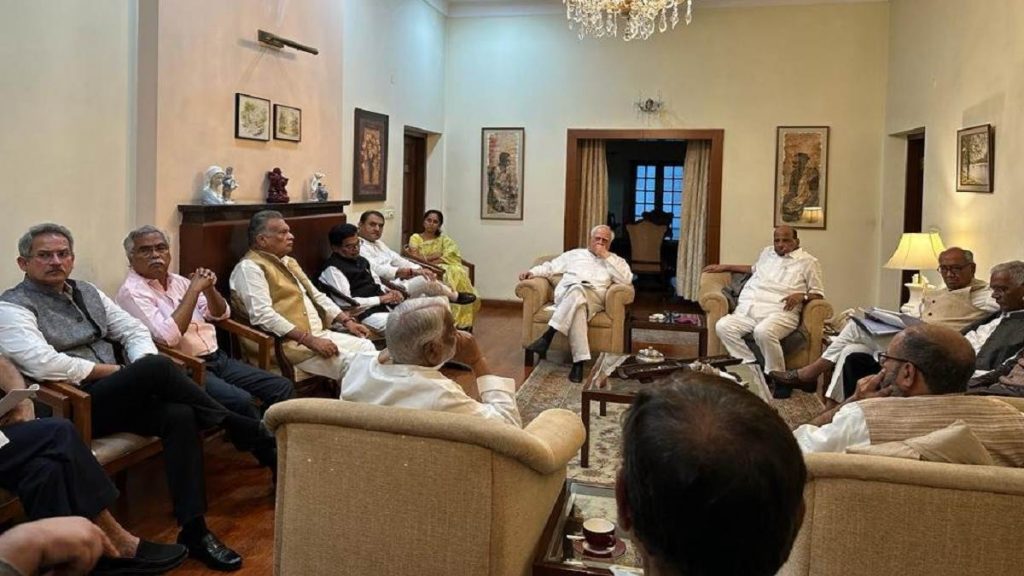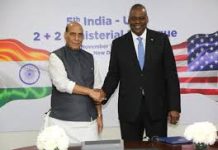As most of the regional parties have thrived on migration of traditional Congress voters to its fold, they balk at the idea of aligning with it due to fears of losing its acquired support base. But scattered opposition will be in no position to take on the BJP in 2024, writes Mudit Mathur
The big picture of opposition unity to challenge brand Modi in 2024 General Elections is still blurred as alliance on the basis of common principles remains elusive. The opposition is faced with a herculean challenge to cross the 2019 vote sharing mark of the ruling BJP, which came to power with a thumping majority by winning 303 Lok Sabha seats and securing 56.01 percent of votes polled. The winning formula of BJP was based on a well researched pulse of the people at the grassroots, planned and executed strategy focusing around the philosophy of Hindutva, nationalism and welfarism.
Uttar Pradesh, which is the biggest stakeholder in national polity, sends 80 members to Lok Sabha. With the historic contribution of the state spearheading freedom movement, it had been a stronghold of the Congress party before Mandal-Kamandal caste politics and religious saffron tide of Hindutva post-1989 forayed into the state. Its traditional voters, belonging to backward castes, deserted the party and joined Samajwadi Party and a large chunk of Dalit voters crossed over to Bahujan Samaj Party. Later, the BJP created its own political space by snatching non-Yadav and non-Jatav castes from these parties whereas Brahmins and Thakurs readily sided with power. The phenomena pushed the Congress to margins with the party losing even its strongholds to BJP.

Reduced to 52 members in Lok Sabha from across the country, now the Congress party through Bharat Jodo Yatra aimed at challenging the core ideology of ruling BJP and its parent organisation RSS (Rashtriya Swayamsevak Sangh). The Yatra tried to highlight how systematic attacks made by saffron forces endangered the established principles of democracy, federalism, ethnic plurality, free speech, equality, declining independence of autonomous constitutional institutions and above all fundamental ethos of the nation adopted in the preamble of the Constitution for building India as a sovereign–socialist–secular–democratic republic securing social, economic and political justice to all its citizens with liberty of thought, expression, belief, faith and worship.
The opposition feels that the idea of India is being threatened by divisive politics of BJP and there is need to counter it by unitedly challenging the BJP in the upcoming Lok Sabha elections in 2024. The move by regional political leaders to forge an alliance keeping equal distance from BJP and Congress seems an exercise in futility as it is not going to consolidate votes against BJP. Rather it will pave the way for the saffron party for a hat-trick victory in the 2024 general election. This move gained momentum after the meeting of Samajwadi Party chief Akhilesh Yadav and Trinamool Congress chief Mamata Banerjee during the recently held national executive meet of Samajwadi Party in Kolkata. Both the leaders resolved to reach out to other regional parties for a national alliance keeping equidistant from both the BJP and the Congress.
Trinamool Congress chief Mamata Banerjee is leading the move to unite the opposition parties under one umbrella, and has already approached Odisha chief minister Naveen Patnaik in this regard. However after the meeting, both the leaders said that their discussion had focused only on the need for strengthening the country’s federal structure. It appears that Patnaik is keeping his options open and remained non-committal to Mamata’s campaign.
“It was a courtesy call and there was no in-depth discussion at all about serious political matters. We just said the federal structure in India should remain permanent and strong,” BJD chief Naveen, with TMC supremo Mamata Banerjee by his side, told reporters after their half-an-hour-long meeting at “Naveen Niwas”, the Odisha CM’s residence in Bhubaneswar.
After holding a meeting with Patnaik, Mamata Banerjee also held discussion with former Karnataka chief minister and JD (S) leader H D Kumaraswamy at her residence in Kolkata. Both the leaders discussed the present political situation in the country and the way forward to fight and defeat BJP in the 2024 Lok Sabha poll. According to TMC leaders, meetings with non-BJP and non-Congress leaders are part of the party’s efforts to cobble up an opposition unity with regional powers. She agreed to campaign in Karnataka during forthcoming assembly election in the state on HD Kumaraswamy’s request.
The leaders of various opposition parties are facing tough times in various states from the federal investigation agencies such as the Enforcement Directorate, the CBI and the Income Tax Department. They allege gross misuse of these agencies targeting them and their close aides at the behest of the Modi government. These agencies are alleged to be acting as a political tool toppling elected governments of their rival political parties by engineering large scale defections breaking them economically and organisationally thereby creating an atmosphere of political uncertainty.
In Maharashtra, the Shiv Sena government led by Uddhav Thackeray was toppled allegedly using such agencies for arm twisting of several legislators who ultimately joined hands with BJP paving way for the change of guard in the state. The leader of the party, Sanjay Raut was arrested by the Enforcement Directorate for months without any credible evidence resulting in discharge of allegations of disproportionate assets. One of the founders of Aam Aadmi Party and party ideologue, Manish Sisodia is languishing in Tihar jail facing corruption charges in the Excise duty policy of Delhi government. NCP leader Nawab Malik is also facing probe in PMLA case instituted by ED.
For the first time, BJP tasted success in overthrowing a Congress government in 2016 in Arunachal Pradesh. The Congress lost Arunachal Pradesh, Madhya Pradesh and Karnataka to the BJP while in power as the saffron party managed to wean away a section of its MLAs and formed governments. The party lost the Puducherry government just two months before the elections as five of its MLAs and one of ally DMK resigned, amid Congress allegation that it was engineered by the BJP. In Manipur and Goa, Congress emerged as the single largest party, but BJP managed to form governments after breaking the Congress legislature party. In Rajasthan, the BJP attempted to wean away Sachin Pilot to break the Ashok Gehlot-led Congress government like it did in Madhya Pradesh where it managed to rope in Jyotiraditya Scindia to unseat Kamal Nath-led government. Gehlot however managed to thwart the BJP designs.
Telangana Chief Minister and Bharat Rashtra Samithi (BRS) chief K. Chandrasekhar Rao’s (KCR’s) daughter Kalvakuntla Kavitha is also facing a probe by the CBI over allegations relating to Delhi liquor ‘scam’ and the Enforcement Directorate (ED) has named her in its chargesheet in the case. Rao has been active to forge a coalition of opposition parties at national level. He initiated a dialogue with Samajwadi Party chief Akhilesh Yadav, former Maharashtra chief minister Uddhav Thackeray, Jharkhand Chief Minister Hemant Soren, Delhi Chief Minister Arvind Kejriwal, Kerala CM Pinarayi Vijayan and Punjab CM Bhagwant Mann.
Telangana witnessed posters during the visit of Union Home Minister Amit Shah depicting the morphed faces of Assam Chief Minister Himanta Biswa Sarma, Union minister Jyotiraditya Scindia, senior Karnataka BJP leader and former minister K.S. Eshwarappa and West Bengal’s Leader of the Opposition Suvendu Adhikari with the Nirma poster girl. The posters were apparently inferring that these leaders became clean and were spared from investigations relating to alleged scams soon after they joined the BJP defecting their parties.
“From last June, the Central government has constantly been sending its agencies to Telangana. Why? Because Telangana elections are due in November or December. There have been more than 100 CBI raids, 200 ED raids, over 500 income tax raids, and 500 to 600 people have been questioned under the NIA,” Bharat Rashtra Samithi (BRS) leader Kavitha said, adding that all of them are either politicians, members of our party, or business houses that don’t subscribe to the BJP’s diktats.
AAP’s Rajya Sabha member Sanjay Singh on the floor of house raised the issue of raids at the opposition leaders by the Enforcement Directorate (ED). He alleged that 3,000 such raids have been conducted. He alleged that the government agencies were deliberately harassing the opposition.
The raids in Chhattisgarh were planned just ahead of the All-India Congress Committee’s plenary session in Raipur. The state is scheduled to go for polls later this year. The ED conducted searches at several locations in Chhattisgarh, including the residences of Congress MLAs and party officials as part of its investigation into the coal levy case. The investigation is based on a complaint by the Income Tax department, which claimed an illegal levy of Rs 25 per tonne was “extorted” for the coal transported in Chhattisgarh by senior bureaucrats, businessmen, politicians and middlemen. An aide of chief minister Bhupesh Baghel was arrested in December 2022 for alleged involvement in the case.
In a significant move, 14 political parties approached the Supreme Court against the alleged use of central investigating agencies such as Enforcement Directorate and Central Bureau of Investigation in arresting opposition political leaders and other citizens after they exercised their fundamental right to dissent and disagree with the present Union Government. The matter which was mentioned by Senior Advocate Abhishek Manu Singhvi before a bench comprising CJI DY Chandrachud, Justice PS Narasimha and Justice JB Pardiwala has been listed for April 5, 2023.
The petitioners included Indian National Congress, DMK, RJD, BRS, Trinamool Congress, AAP, NCP, Shiv Sena (UBT), JMM, JD(U), CPI(M), CPI, Samajwadi Party, and J&K National Conference. The petition described that these parties together represent 45.19% of the votes cast in the last State/UT Assembly Elections, and 42.5% of the votes cast in the 2019 General Elections, and hold power in 11 States/UTs.
The strategy of BJP appears to discredit all the opposition leaders with charges of corruption and disproportionate assets to divert the political narrative from its performance with regard to poll promises and failures in governance.
Meanwhile, several opposition parties on 24 March met at NCP chief Sharad Pawar’s residence to discuss alleged tampering of EVMs during elections and said they will approach the Election Commission on the matter. The meeting, which was attended by Congress, CPI, CPI(M), Aam Aadmi Party, Janata Dal (United) and Shiv Sena among others lasted for over an hour. The Trinamool Congress conspicuously skipped the meeting despite an invitation by the NCP chief.
“A meeting of Opposition leaders was held at my residence today to discuss the efficacy of EVM and the concerns raised by political parties about voting through EVM,” Pawar tweeted. Former Congress leader Kapil Sibal, who also attended the meeting, said: “Any machine can be manipulated. Our concerns are that we have been saying over the years that it is not a standalone machine. The internet is being used so it can be programmed. We will have to take a call on what needs to be done, because it doesn’t seem we will get any answers.”“The leaders had only discussed the law pertaining to the case,” Sibal said.
“We will once again go to the EC and seek written responses and if it does not respond, we will decide our future course of action. Any machine in the world can be manipulated and it is a fact that no other democracy in the world, whether it is Europe or the UK or the US, uses EVMs for the purpose of voting,” Sibal asserted.
Senior Congress leader Digvijaya Singh said the ECI must take note of the apprehensions in the minds of political parties and the people at large about the functioning of EVMs. “They (ECI) used to say these are standalone machines but now they say these are not standalone machines. Elements such as the name of candidates, party symbols are fed through the internet into the machines. They used to say the machines have one-time programmable chips, but now they say these are fitted with multiple programmable chips,” Singh alleged.
CPI general secretary D Raja said all parties agreed that several questions are being raised over the credibility of EVMs. “We must seek a proper response from the Election Commission. We will see what the poll body says and decide the next course of action,” he added.
EVMs have been a contentious issue for Opposition parties. The allegations of tampering of the machines have surfaced during various polls but no evidence has emerged so far to prove the charge. The Election Commission has maintained that the machines are secured and safely transported for voting.
The meeting comes amid efforts of some of these parties to unite and include more political outfits into their loose alliance ahead of the 2024 general elections. The unity efforts of regional political leaders lack pan-India acceptability on ideological framework, policy and network of workers.
As most of these parties thrived on migration of traditional Congress voters to its fold in due course of time, regional parties will never feel comfortable aligning with it due to intrinsic apprehensions of losing its acquired support base. Under these circumstances, scattered opposition is not in a position to make any formidable combination against Prime Minister Narendra Modi juggernaut, unless opposition unites in a single block. PM Modi too remarked in the Lok Sabha that ED–CBI probes gave an opportunity to opposition parties to unite against his government.













